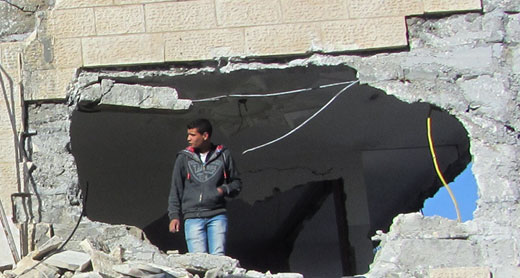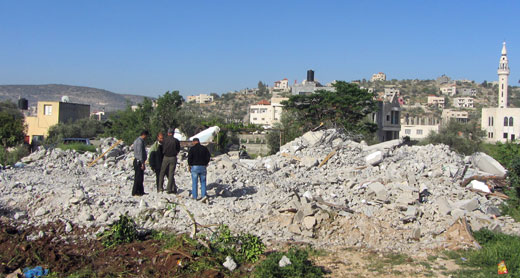PLO slams Israel after 7 Palestinian homes torn down
 Tuesday, April 5, 2016 at 08:22PM
Tuesday, April 5, 2016 at 08:22PM http://www.maannews.com/Content.aspx?id=770985
4 April 2014 Ma'an News Agency
 (Photo credit: B'Tselem)
(Photo credit: B'Tselem)
BETHLEHEM (Ma'an) -- PLO Secretary-General Saeb Erekat on Monday slammed Israel for the latest wave of demolitions that saw seven homes torn down across the occupied West Bank and East Jerusalem in a single night.
"This is another act of collective punishment committed by Israel against the Palestinian civilian population in violation of international law and Israel’s obligations as the belligerent occupying power," Erekat said in a statement issued by his office.
In the early hours of Monday morning, Israeli forces tore down three homes belonging to slain Palestinian attackers in the village of Qabatiya south of Jenin, and another four homes that were built without permits -- one in Surif, two near Duma, and one in occupied East Jerusalem.
The demolitions are part of the most extensive demolition campaign in the occupied West Bank in the last seven years, which the UN says has left more than 650 Palestinians homeless in under three months, more than half of whom were children.
Erekat said in the statement that Israel had demolished 157 homes in the occupied Palestinian territory since last September.
He warned Israel that every violation of human rights would be "documented, reported, and presented to the relevant international bodies, including the International Criminal Court."
He also warned the international community that "granting impunity for continued and systematic Israeli crimes will not achieve a resumption of negotiations. Rather, it is killing any realistic political horizon to end the Israeli occupation of the State of Palestine."
His comments referred in particular to a recent Human Rights Council resolution to ensure accountability for human rights violations in the occupied Palestinian territory. The resolution was passed but saw the abstention of countries such as the UK, Germany, and India.
"We call upon those countries to review their positions," Erekat said. "Allowing Israel to act as a state above the law only perpetuates Israeli violations of Palestinian human rights and ensures the destruction of the two-state solution."
----------------------------------------------------------------------------------------------------------------------
Israeli security forces demolish four families’ homes, punishing 28 people, including 6 minors, for actions of persons no longer alive
http://www.btselem.org/punitive_demolitions/20160405_four_homes_demolished
Published: 5 Apr 2016
Early on the morning of Monday, 4 April 2016, military, Border Police and Civil Administration forces arrived at the village of Qabatiyah, Jenin District, and demolished three apartments belonging to the families of Ahmad Nassar, Muhammad Kmeil and Ahmad Abu a-Rob. The demolitions were a punitive measure for a gunfire attack the three perpetrated on 3 February 2016 at Damascus Gate in the Old City of Jerusalem, killing Border Police officer Hadar Cohen. The three were shot dead by security forces present on the scene. On 24 March 2016, the High Court of Justice (HCJ) dismissed the petitionsfiled by the families and HaMoked: Center for the Defence of the Individual, upholding the demolition of the apartments.

Ruins of Nassar family’s home, Qabatiyah. Photo by Abdulkarim Sadi, B’Tselem, 4 April 2016
The forces manually tore down the walls of the apartment belonging to Ahmad Nassar’s family, which is located in a two-story building and used bulldozers to demolish the apartments belonging to the families of Muhammad Kmeil and Ahmad Abu a-Rob. The demolition of the three apartments left 22 people homeless, including four minors.
A few days earlier, on Thursday 31 March 2016, military troops came to Hebron to demolish the home of Ihab Miswadi’s family. Miswadi had been shot dead by security forces on 7 December 2015 in the Tomb of the Patriarchs, after he stabbed and fatally wounded Gennady Kaufman. Kaufman succumbed to his wounds three weeks later. On 23 March 2016, the HCJ dismissed the petition filed by Miswadi’s family and HaMoked, upholding the demolition order. The military manually demolished the walls of the apartment, which was home to six people, including two minors.
Since October 2015, Israel has stepped up house demolitions as a means of punishing relatives of individuals who perpetrated attacks or were suspected of perpetrating or aiding such attacks. These latest demolitions bring the total number of demolitions and full or partial sealing of homes to 36 since October 2015. As a result of the large scale sealing and demolition operations, 147 people have lost their homes, including 65 minors.

Ruins of Abu a-Rob family’s home, Qabatiyah. Photo by Abdulkarim Sadi, B’Tselem, 4 April 2016.
------------------------------------------------------------------------------------------------------------------------------
Palestinian rights group submits Israeli war crimes report to ICC
MARCH 31, 2016 11:03 P.M. (UPDATED: APRIL 3, 2016 12:13 P.M.)

BETHLEHEM (Ma’an) -- In ongoing efforts to hold Israel accountable for gross violations of international law, Palestinian legal rights group Badil has published key findings on alleged war crimes during the 2014 Gaza war that the group submitted to the International Criminal Court earlier this month.
The report documents in detail the accounts of Palestinian victims of Israel’s large-scale military offensive on the besieged enclave and charges high-level Israeli officials with war crimes and crimes against humanity.
The Palestinian committee in charge of following up with the ICC met with court representatives in Jordan earlier this month to arrange a visit to the Gaza Strip. The ICC began conducting a preliminary probe in January last year examining available information to decide whether there was a "reasonable basis" to proceed with a full investigation.
The impossible task of holding Israel accountable
While Palestinian leadership has pursued bringing justice for Palestinians in the international arena -- through UN bodies in particular -- Badil said the ICC may have the potential to bring such justice to fruition when other bodies prove unable.
Simon Reynolds, lead researcher and author of the recent Badil report, told Ma’an that the ICC in theory is less prone to political interference than the UN General Assembly or Human Right Council, which operate on the basis of votes and behind-the-scenes negotiations.
Reynolds said that while the workings of the ICC are not entirely insulated from external influence, the ICC as a formal criminal tribunal provides processes that are far more rigid and transparent than other international forums used by human rights defenders to seek protection of Palestinians’ human rights.
“In addition,” Reynolds said, “The ICC also allows us to consider the criminal responsibility of individuals, rather than than the unlawful practices of States, which forms the focus of UN resolutions.
“This could prove an extremely potent tool to achieving accountability for Israeli-perpetrated war crimes and crimes against humanity, as it forces offenders to acknowledge that they may personally have to answer for their crimes, rather than hiding behind the anonymity that comes with 'state responsibility.”
Reynolds, who was a major actor in submitting the Badil report to the ICC earlier this month, told Ma’an that utilizing international avenues to hold Israel and its citizens accountable for unlawful policies and actions was “inherently difficult” due to “a lack of political will among relevant actors.”
“Many powerful states and regional bodies have significant political and economic interests tied up in the fate of Israel, and Israel's projected image of a law-abiding, democratic state in the midst of the turmoil of the Middle East is essential to the maintenance and development of these interests,” Reynolds said.
“The difficulty lies not in documenting and reporting Israeli war crimes and crimes against humanity; such evidence is abundant.
“Rather, the difficulty is found in persuading those in positions of power to take notice, and to realize their legal and moral obligations to intervene.”
--------------------------------------------------------------------------------------------------------------------------------
 APJP |
APJP |  Post a Comment |
Post a Comment |